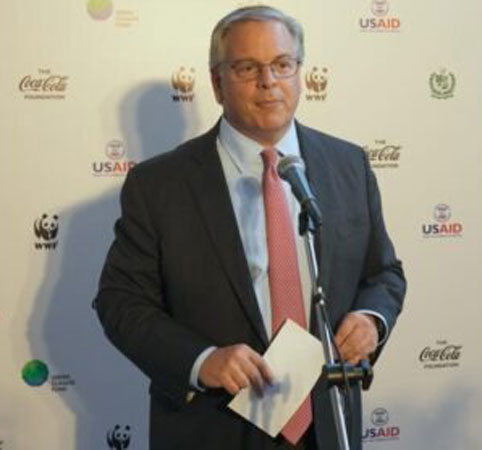 Ambassador of the United States in Islamabad Donald Blome on Tuesday addressed the launch of the Recharge Pakistan initiative here at the Pakistan Institute for Parliamentary Services (PIPS).
Ambassador of the United States in Islamabad Donald Blome on Tuesday addressed the launch of the Recharge Pakistan initiative here at the Pakistan Institute for Parliamentary Services (PIPS).
The ambitious climate project aims to bolster flood resilience and enhance water security across vulnerable regions in Pakistan. Ambassador Blome began his remarks by recognizing PIPS, an independent research and training facility for parliamentarians established with U.S. funding. He emphasized the institute’s significant role in educating and supporting Pakistani lawmakers through extensive training and policy research.
The “Recharge Pakistan” initiative, which sees a $5 million contribution from the United States, is designed to address critical water management challenges exacerbated by climate change. Groundwater, vital for drinking water, agriculture, and livestock, is under threat as climate change disrupts natural water recharge processes. Ambassador Blome likened groundwater to a battery that powers essential life functions but is increasingly unable to recharge due to changing environmental conditions.
The project will deploy a network of green infrastructure solutions to rehabilitate floodwater channels, restore wetlands, and improve soil water absorption. Expected outcomes include reducing greenhouse gas emissions by nearly 53,000 tons of CO2, creating 127 new groundwater storage basins, and reducing flooding hazards across 50,000 hectares. The initiative is projected to benefit approximately 687,000 people directly and over seven million indirectly in Balochistan, Khyber Pakhtunkhwa, and Sindh.
The envoy highlighted the historical U.S.-Pakistan partnership in water management, citing collaborative projects like the Mangla and Tarbela dams. He underscored recent efforts under the U.S.-Pakistan Green Alliance framework, which focuses on renewable energy, smart agriculture, and water management.
Recharge Pakistan builds on this longstanding partnership and represents a further commitment to addressing climate change impacts. The initiative comes in response to the severe effects of the climate crisis experienced by Pakistan, including the devastating 2022 floods and the impacts of rising temperatures on glaciers and agriculture.
Blome commended the efforts of the Ministry of Climate Change and Environmental Coordination, the World Wildlife Fund (WWF), and other partners for their role in planning and implementing the project. He reiterated the U.S. commitment to supporting Pakistan in building a greener, more climate-resilient future.
The launch event marked a significant step in the ongoing collaboration between the U.S. and Pakistan, aiming to mitigate the adverse effects of climate change and promote sustainable development in one of the world’s most climate-vulnerable regions.